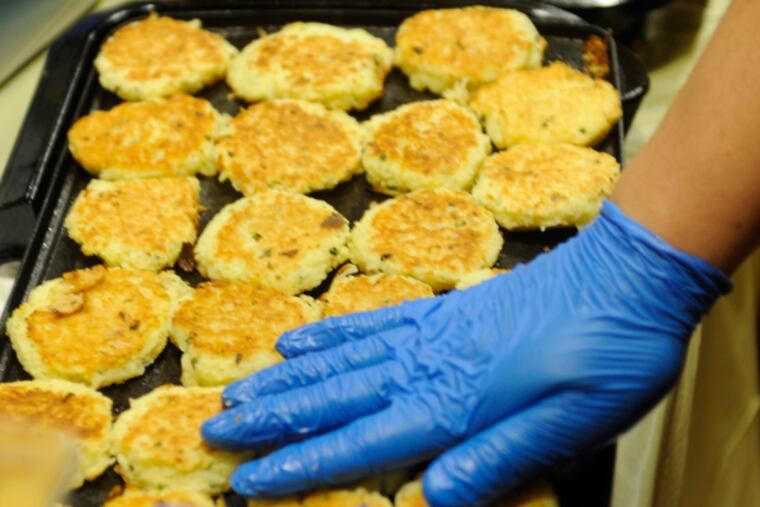Latkepalooza at Gershman Y offers tasty latkes in many flavors
It was clear right at the start that these were not going to be your mother's potato pancakes. After all, how many of your mother's latkes could be described as Cajun? Or be, for that matter, a potato pancake version of the Greek spinach pie - "spanalatke" - right down to the tzatziki sauce?

It was clear right at the start that these were not going to be your mother's potato pancakes.
After all, how many of your mother's latkes could be described as Cajun? Or be, for that matter, a potato pancake version of the Greek spinach pie - "spanalatke" - right down to the tzatziki sauce?
Yet the 3,300 latkes that were consumed by a sellout crowd of 400 men, women, and children Sunday afternoon at the Gershman Y's 12th annual Latkepalooza reflected the diversity of the cuisine of the nine restaurants - and the venerable Betty the Caterer, who accepted the invitation to participate.
For the uninitiated, latkes are traditionally eaten as part of Hanukkah, which begins Dec. 16 this year.
The oil for cooking latkes symbolizes the miracle the festival celebrates, as does that used to make sufganiyot (doughnuts minus the holes that are filled with jelly), also served at Hanukkah, said Debbie Fleischman, the Gershman's publicist.
Latkepalooza began as way to introduce the Gershman and its programs to a larger audience, said Nancy L. Hohns, who was on the board and was marketing chair at the time.
"It was food and fun," she said, adding that organizers were a bit worried about the event's success that first year.
"It gives the participating restaurants a chance for face-to-face contact with new diners," said Sahar Oz, the Israeli-born director of programming for the Gershman, who worked since August to organize the event.
"Most of these restaurants don't offer latkes on their menus, so this gives them the chance to show what their cuisine is like," he said.
Yet, there are the traditionalists.
"My mother's latkes were good and greasy, and my brother and I would fight over them," said Morris Alein, 67, of Philadelphia, who has made it to every Latkepalooza.
"My nephew was a chef, and he was at the first one, making my mother's recipe," he said. "Since her latkes were the gold standard, I came to ensure quality control."
Alein found something besides latkes at the first Latkepalooza. It was there he met Mina Smith-Segal, 72, and they became bashert - Yiddish for "soul mates" - and they've been together since.
"We still don't live together," Smith-Segal interjected as she dug her fork into the latke on her paper plate. "We live close by, though."
There really doesn't seem to be a standard latke, at least according to Israeli-born Shlomo Kauffman of Catahoula Bar & Restaurant on Front Street, which was offering the Cajun-style ones.
For example, sour cream on latkes is an American phenomenon.
"In Israel, we sprinkle granulated sugar on them," Kauffman said. "North African Jews put salt on them, while Europeans use applesauce," he said.
Jeff Hudson of Estia on Locust Street was offering the tzatziki sauce on his spanalatkes, which used potatoes as the binder but included spinach, scallions, leeks, and feta cheese.
"We've had a great response to what we do," said Hudson, who has participated for several years.
There were latkes made of sweet potatoes. Some were a mix of sweet potatoes and regulars, or, in Betty the Caterer's case, potatoes and zucchini.
Some preferred russet potatoes, others Yukon golds.
There was a variety of toppings, including cherries, cucumber dill, Cajun hot sauce, cardamom, pineapple, and watermelon. Chris Laskey, the sous chef at Stephen Starr's Frankford Hall, provided homemade applesauce, made from red delicious, and Kealan O'Donnel of Talula's Garden on Washington Square provided sour cream made from buttermilk.
Each of the nine restaurants provided 300 latkes for the event, and Betty the Caterer offered 450, Oz said. They were cooked in olive, canola, or vegetable oil.
For 300 latkes, Kauffman used about 20 pounds of potatoes, shredded by a machine also used to make french fries, he said, showing unbruised knuckles.
Most of the latke-makers had worked for hours in the morning, shredding the ingredients by machine, cooking the pancakes in advance, and then searing them on site.
"It wasn't all that difficult," O'Donnel said. "We have the equipment to deal with lots of potatoes."
215-854-2472 @alheavens